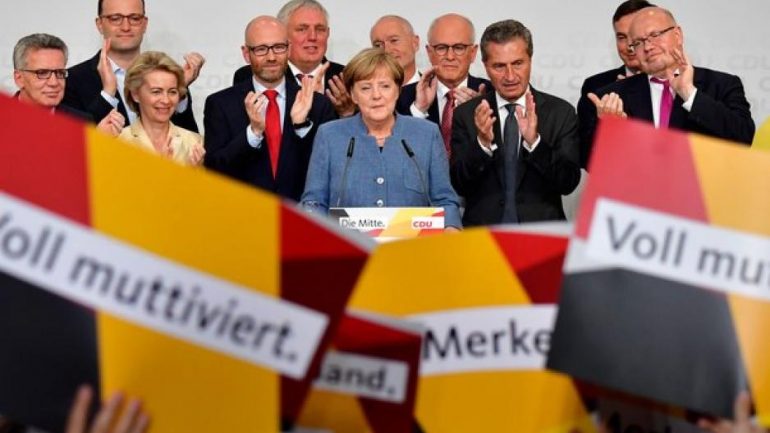Leaders of the Christian Democrats (CDU), the Conservative party led by Chancellor Angela Merkel, voted Sunday in favor of a new "grand coalition" with the Social Democrats (SPD) to end the political stalemate in Germany.
Merkel, whose fourth term was called into question last week, when the Christian Democrats (CDU / CSU)'s exploratory talks with the Free Democrats (FDP) and the Greens collapsed, secured a political lifeline from the SPD on Friday.
Under intense pressure to guarantee political stability and to avoid leading the country to new elections, the Social Democrats changed their position and agreed to start talks with Merkel.
"We intend to form an effective government," Daniel Guinder, the conservative state prime minister of Schleswig-Holstein, told reporters after a four-hour meeting of the CDU leadership. "We firmly believe that this is not (can) be a minority government, but a coalition with a parliamentary majority. "This is the big coalition," he added.
The Christian Socialist (CSU) Bavarian state prime minister, Horst Seehofer, also voted in favor of the grand coalition earlier yesterday. "A coalition between the Conservatives and the SPD is the best choice for Germany — better in any case than a coalition with the Free Democrats and the Greens, new elections, or a minority government," Seehofer told Bild am Sonntag.
An Emnid poll published in the same newspaper showed that 52% of Germans are in favor of the grand coalition.
Several European leaders stress that Germany must have a stable government as soon as possible so that the European Union can discuss its future. Among other things, French President Emanuel Macron's proposals for reforms in the eurozone are to be considered and Brexit negotiations are to move forward.
Merkel, who made it clear on Saturday that she would seek the formation of a new grand coalition, assured, however, that the caretaker government would continue to make normal decisions until the new government is formed.
Conservative youth called on the parties to agree by Christmas and said that if no agreement was reached, Merkel should choose to form a minority government.
But as a sign that the process would take time, the CDU decided on Sunday to postpone its conference scheduled for mid-December — scheduled to take place at the time to approve the formation of the Jamaica coalition.
However, the Social Democrat state prime minister of Lower Saxony, Stephen Weil, said he did not see how decisions could be made before the end of the year. It will be a "long way" for the SPD, Weil discounted speaking on German public television ARD.
Before even starting contacts, the parties argue over the political priorities of the next government. The CDU wants to pursue a tough fiscal policy, cut some taxes and invest in digital infrastructure. It wants to appease the CSU by pursuing its markedly tougher policy on the refugee and immigrant crisis.
For their part, the Social Democrats refer to investments in education and housing, changes in social security and the health system, while demanding that no limit be imposed on the number of immigrants and refugees received by Germany.
Although political analysts say the SPD is holding the strongest position in the talks, party officials are divided over whether a new grand coalition should be formed or simply the Social Democrats showing "tolerance" for a Conservative and Green minority government.
